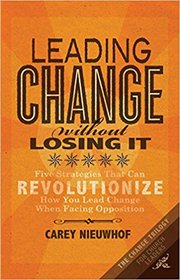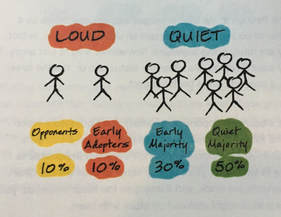 My introvert really comes out on planes. I have trouble hearing sometimes, especially with a lot of background noise, so I'm that guy who reads on airplanes. On our flight for vacation I was able to read something by one of my favorite authors. Seriously, I don't ever read a book, blog, or article by Carey Nieuwhof where I don't have an assumption challenged or learn something incredibly useful. His book Leading Change Without Losing It caught my attention at a conference last year so I grabbed a copy of it. It's personal because we're in the midst of what can best be described as a 5-7 year effort to lead our church into its next chapter of becoming multigenerational. So I wanted to draw out from Nieuwhof as much as I could to be a help. I cannot recommend this book strongly enough to pastors or ministry leaders who are gripped by a vision, a dream, an idea of what the future could hold if we could only get there. Those dreams are what keep us awake at night and going in the day. Those dreams are why week in and week out we pour our lives into people, because we have a sense of what is going to come.  Rather than give away everything, I want to emphasize two things that really stood out: doing math and not giving up. One of the inevitable things about leadership and especially in leading change (which go hand in hand -- you're not truly leading unless you're making change) is that you'll get blowback. But Nieuwhof reminds us all that louder ≠ more. Jon Acuff famously called it "critics math" where we hear 1 insult + 1000 compliments = 1 insult. But the reality is, only a few are going to be against change -- it might require them to sacrifice, they may hold onto the past, they might rather be comfortable. And just because they may be loud doesn't mean they're many. In fact, Nieuwhof drops a bomb when he asks if we're willing to sacrifice reaching 10,000 people in the name of keeping 10 people happy? The other thing is simple: don't give up. We're too influenced by our microwaves and Netflix, where we want what we want immediately because we've been socially conditioned to getting it. But any lasting, institutional, cultural change in a church is going to take time. And it's going to take time to reach the critical breakthrough moment where the momentum has shifted towards the healthy changes, processes, and culture. As one pastor I know said, it takes eating a lot of pie, time he spent talking with people about a needed change that would run up against significant pushback. It took much longer than he wanted, but it happened. The change we want to see happen to come back to the dream that we have is gong to be a marathon, not a sprint. And we can't simply jump ship when it gets hard or when we don't see immediate results week to week. Thanks Carey for a great book. I hope others will find it as useful.
1 Comment
 I was a huge fan of The Muppet Show as a kid. And two of the most memorable character are Statler and Waldorf, the two guys who sit in the balcony and rip on everything the show does. Nothing is ever good enough. The jokes aren't ever funny enough. And for some reason these guys keep showing up to every episode. They were about as much fun as having wet socks. Think about the last time you got caught in a downpour and ended up with soggy feet. It's not much fun. Wet socks ruin your day. They make your shoes stink, they make every step squish, and they truly become a downer. One of the hard struggles for ministry leaders is to avoid the trapping of becoming like Statler & Waldorf and becoming a wet sock. Leaders who are wet socks aren't any fun to be around, they stifle the joy of others around them, and in many cases they're blissfully unaware that they're even acting like a wet sock. Wet sock leaders miss their important role of being the chief storyteller because instead of framing and leading a narrative of joy, freedom and excitement, they frame a narrative of cynicism and one where no one is ever able to meet the standard.
Avoid Being a Wet Sock in Relationships - In 3 seconds you can see the impact a leader has on the others around them. Watch what happens when the leader walks in the room. If everyone gets quiet and looks sheepish, they'd rather have dental work. But if there's genuine delight in seeing a leader, you can see the beginning steps of true team chemistry. Leaders who are wet socks are leaders no one wants to be around unless they have to. Wet sock leaders suck the air out of the room. But healthy leaders are naturally contagious to be around. Avoid Being a Wet Sock Through Encouragement - Wet sock leaders have a hard time building up others around them. Others' accomplishments aren't something easily celebrated or acknowledged. Wet sock leaders struggle with encouragement because of their own need for affirmation, and become like a vacuum for encouragement on a team. Healthy leaders are able to recognize others' accomplishments and enjoy them, and are able to be cheerleaders for others. Too many times leaders who are wet socks find themselves craving encouragement and are unable to give it to others. But a healthy leader is, as Ken Gosnell describes himself, Chief Encouragement Officer. Avoid Being a Wet Sock by Patience - Unfortunately, wet sock leaders aren't willing to be patient with others around them. Just as Statler & Waldorf couldn't wait for the joke to develop or for Kermit to get the show started, wet sock leaders don't have the ability to, as the Bible describes, long suffer with others. They want immediate results. They get frustrated when people aren't as spiritual as they are or aren't as far along their discipleship journey. On the other hand, a healthy leader will be patient with people who ask if they've read the most recent book by <insert whackadoo author> about <insert whackadoo theory about the end times> which details <insert how somehow America is in the Bible>. Those things can be maddening. But a healthy leader recognizes that none of us are where we should be. And rather than beat people up or make them feel bad, they gently and patiently walk them through how their faith informs their thinking. Fruit of leadership happens over years, if not decades. What else can a leader do to avoid being a wet sock? 
Leaders have to be insatiable learners, or else they won't last. There's always more for a leader to know, more to read, more to study, more to soak in and appreciate. And so a leader cannot ever be satisfied with what they know or what they've studied.
But does that automatically translate into a tuition based formal degree track of education? I think it's important for a leader to get as much education as they can reasonably afford and that will help them achieve the goals they might have. Formal education isn't for every leader, no matter the context. Because of the considerations that have to go into it, let's ask a few questions: 1. Do I need to pursue formal education as part of my career development? I know we don't like the word "career" when it comes to ministry, but let's use the term without the baggage. All of us have a sense of what we've been called to, and we might even have a clear picture of what that is. Regardless, we all have an idea of what God wants us to do. So that begs the question, do I need the degree for that? A lot of leaders unnecessarily put themselves and their family in financial hardship or absent time to pursue a degree they don't need. 2. Is this something my wife (and kids) are supportive of? The thing is, when you're young and single, you don't have to answer to anyone or check a calendar with. That all changes when you get married, and changes again when you have kids. So that's where this comes in. If you decide to pursue a degree, a masters or a doctorate, it will require a lot of time, money, attention, and focus. And it will require that for an extended period of time. A lot of people fail to finish a degree program not because they're not smart enough, but because the constraints got to be too much. 3. Is this something we can afford right now? Tuition isn't cheap, no matter how gracious and generous your school might be with financial aid. Throw in books, fees, travel, printing (one of the joys of doctoral work, your dissertation has to be printed on the fanciest paper Dunder Mifflin sells!), and the obscene amount of coffee you'll drink, it can be an expensive proposition. And while we most often assume that a degree will give higher earning potential, it's doubtful. When I finished my doctorate I asked about a raise and was told that it didn't mean I deserved a raise just because I finished. 4. Do I have reasonable access to a program? The traditional model of in-person, on-campus learning is still the best in my opinion. You get time to interact with professors and students, you're immersed in the learning community, and you're surrounded by a very encouraging peer group. But you may not be able to get on campus. You may have to look at distance education or an online program. Are you ok with that? Do you have the ability to manage your time, to discipline yourself, to be intentional about logging in and doing the required coursework apart from a regular class lecture time? 5. Is my church on board? Along with your family, your church needs to be on board with your education pursuit. Many seminaries require a church endorsement for your admission and study, to show that you're part of a congregation that affirms your calling and is willing to support you in your education. But you may be in a church that isn't on board with you being gone 2-3 weeks a year for class, or who doesn't like the time commitment it takes to study. That can be tough. Have these honest conversations with your pastor, your deacons, your personnel team, or your elders. 6. What's my end goal? This question is one to ask to figure out what kind of program to go through. If you want to get into teaching, writing, and high-level leadership, think about a terminal degree (PhD or EdD) that will teach you the needed skills. If you want to be an effective ministry leader and grow in your practical application, pursue a professional degree (DMin, DEdMin). There's also other options to think about in terms of end goal outside of doctoral education. Some people want to pursue an MA program because they want the education and the access without necessarily doing the languages or pursuing the full MDiv program. Others have a desire to do doctoral work and gain a theological and philosophical grounding not available in an MA, so they pursue an MDiv or ThM. In terms of "prestige" between the degrees, it doesn't really matter, it's a difference in calling and giftedness. That's part of the body of Christ, it's unique.
For more about this, check out my podcast episode with Dr. John David Trentham from Southern Seminary on higher education.
One of my favorite monthly activities is a monthly pastors lunch. Not only is it free, but I get to spend time with other guys in the area who I otherwise wouldn't run into. We're not in the same denominational association, we're not really in the same communities, and in some cases we're not the same ethnicity. So it's a wonderful time of fellowship as we connect with one another and share about our ministries and families (and college football).
Over the last few years, I've noticed some trends in how we as leaders and our churches cooperate with one another. I think these are healthy for the most part. They foster greater connectivity, ministry, and help remind us that the Kingdom of God is bigger than our backyard. 1. A Willingness to Cross Denominational Lines - I love my denomination. I've been incredibly fortunate to have been part of one that is so supportive of its ministry leaders while in school (if you're part of an SBC church, your tuition in seminary is subsidized by 50%), and has a footprint around the world through missions and church planting. But the Kingdom is bigger than the SBC. And when I spend time with other leaders and churches outside the SBC, I'm refined and reminded about how big the Kingdom is. We do well to cooperate and partner outside our own circles not only for our own soul's sake but also for the sake of our neighbors who are impacted by churches working together. 2. A Desire to Have Older Leaders Involved - This is one of the best things about Millennials, their desire to have older mentors. And when we engage with older leaders who are established, experienced, and wise, we're all better for it. These older leaders have walked longer in our shoes than we've been alive in some cases. And to dismiss their influence is to our downfall. 3. Mission > Method - I wish it was as easy as buying a box set from a bookstore about how to transform our church into North Point, Saddleback, Village, Summit, etc. But it doesn't work like that. In fact it's more than not looking to a box set. In many cases we can't directly copy what others are doing around us, or expect them to fall in line with how we do it. Why? Because our contexts are vastly different, even if we're in the same area code. That's where Mission trumps Method. How we do things is less important than What we do. And what's encouraging is that this is something I see being embraced. 4. Theological Affinity > Tribal Loyalty - We're coming together less along tribal lines and more along lines of affinity for the Gospel. So we're seeing cross-denominational partnerships like NAMB and Acts 29 where church planting is multiplied because affinity for the Gospel is bigger than who gets credit for the plant. We attend conferences where we rub shoulders with people who share a common theological affinity even if we don't come from the same circles. We're willing to put aside our tribal loyalty and listen to, learn from, and engage with friends from different worlds because we've recognized our affinity for the Gospel. 5. Increased Access and Communication - More cooperation can happen because the channels of communication, networking, and access are better than before. We can engage on social media, through podcasts/blogs, through videoconferences, and because of the unceasing presence of our cell phones we have access to each other that once before was only during office hours or in person. Ideas can spark movements and leaders have the ability to cooperate together in ways that were unheard of a generation ago. 6. Humility With Success - I love it when leaders get together for a common mission and make it clear from the beginning "This isn't an XYZ Church thing, it's a Kingdom effort." Why? Because it doesn't matter who gets credit. It's back to the Mission > Method. Not only is the method secondary to the mission but even the success is second to the mission. A friend of mine pastors a larger church in our area and they've made it clear about their push to serve their neighborhoods that it's not about whether or not their church grows, they want to see others succeed. 7. Walls & Stagnant Water - The strange irony of how we're seeing leaders and churches cooperate is that it's just as much true as it is that we're seeing more engagement outside our tribal identity. It's kinda weird. But welcome to life with unending paradox! As much as it's true that we're engaging older leaders, we're crossing denominational lines, and we're putting Mission ahead of Method, I'm also seeing more than a few trends of people isolating themselves among their theological affinity, building divisions based on their theological identity, shutting off outside voices who can speak wisdom and clarity, and more. This is the trend that concerns me, because we quickly become stagnant water when nothing fresh comes in from the outside. |
Scott M. DouglasA blog about leadership and the lasting legacy of family ministry. Archives
August 2023
Categories
All
|
 RSS Feed
RSS Feed



